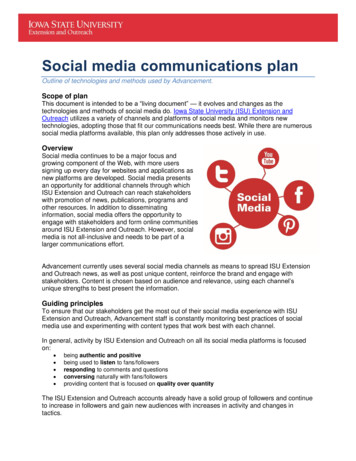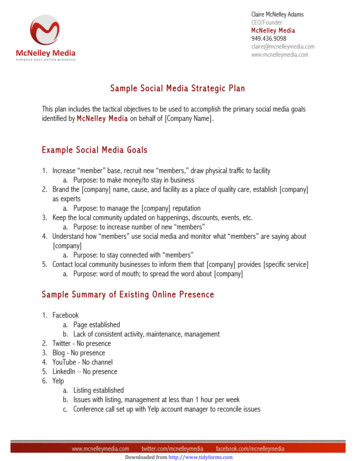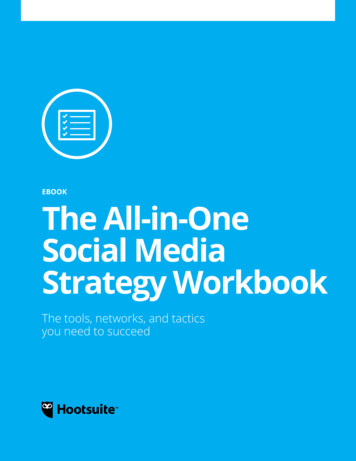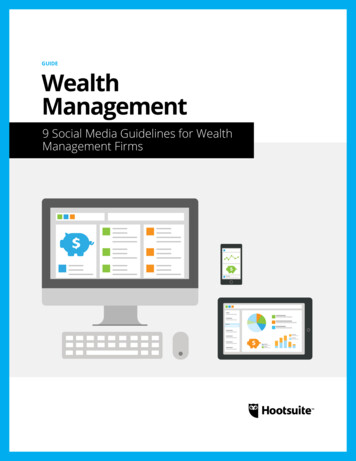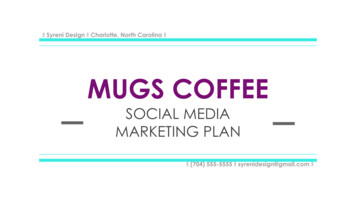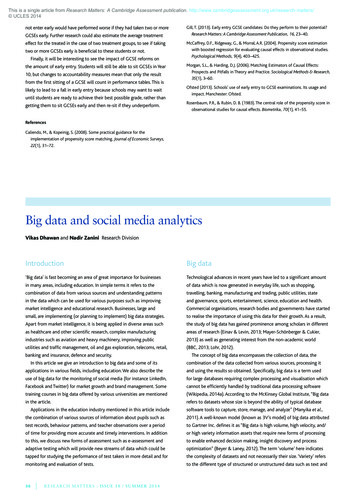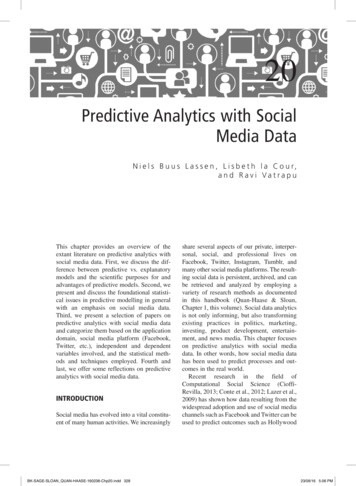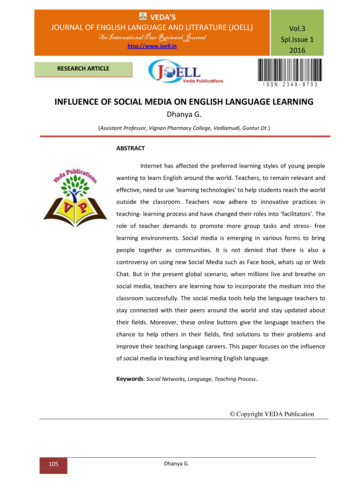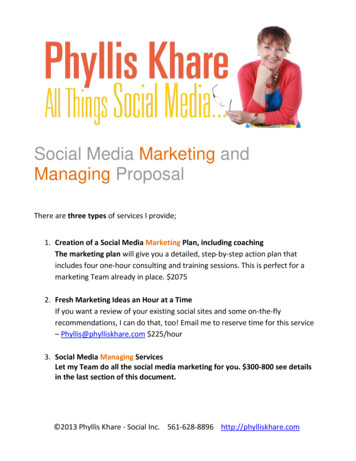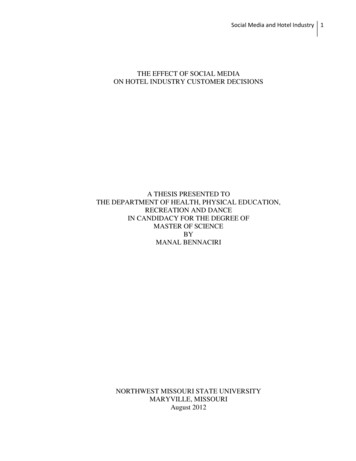
Transcription
Social Media and Hotel Industry 1THE EFFECT OF SOCIAL MEDIAON HOTEL INDUSTRY CUSTOMER DECISIONSA THESIS PRESENTED TOTHE DEPARTMENT OF HEALTH, PHYSICAL EDUCATION,RECREATION AND DANCEIN CANDIDACY FOR THE DEGREE OFMASTER OF SCIENCEBYMANAL BENNACIRINORTHWEST MISSOURI STATE UNIVERSITYMARYVILLE, MISSOURIAugust 2012
Social Media and Hotel Industry 2Running Head: SOCIAL MEDIA AND HOTEL INDUSTRYMedia and hotel industry-How web information can influence customer decisionManal BennaciriNorthwest Missouri State UniversityTHESIS APPROVEDThesis AdvisorDateDean Graduate SchoolDate
Social Media and Hotel Industry 3TABLE OF CONTENTSABSTRACT .6LIST TABLES AND FIGURES .5CHAPTER ONE: INTRODUCTION .8SM Marketing and the Hotel IndustryOnline ReviewsSummary and PurposeCHAPTER TWO: REVIEW OF LITERATURE .13Social MediaThe Impact of Social Media MarketingEffectiveness of Blogs versus Online Magazines (OR the Might of Social Media)The power of Social Media as a branding toolSocial Media as purchasing powerCHAPTER THREE: METHODS h Design and Data AnalysisCHAPTER FOUR: RESULTS . 23Descriptive StatisticsHypothesis TestsCHAPTER FIVE: DISCUSSION 28LimitationsRecommendations for Practice
Social Media and Hotel Industry 4Recommendations for ResearchConclusionREFERENCES . 31APPENDICES . .32Appendix 1: Survey QuestionsAppendix 2: Positive BlogAppendix 3: Mixed Blog
Social Media and Hotel Industry 5LIST OF TABLES AND FIGURESTABLE1: Groups’ Gender, Age, Educational Levels, household members, andincome 20TABLE2: Means and Standards Deviation for Bias, Trustworthiness, Future Use, andRecommendation .25TABLE3: Analysis of Variable Results for Bias, Trustworthiness, Future Use, andRecommendation .26TABLE4: Scheffe Post Hoc Test for Trustworthiness .27TABLE5: Scheffe Post Hoc Test for Future Use . 27TABLE6: Scheffe Post Hoc Test for Recommendation 27
Social Media and Hotel Industry 6ABSTRACTThis study examined the impact of social media on customer perceptions ofmarketing information. Traditional internet sources of marketing information werecompared to web sources that included customer blogs.Blogging is one of the most important social networking tools, and the Travel andTourism Industry today has discovered that blogs have not only positive impacts but alsonegative ones if not managed properly. As blogs become more and more popular as asocial media tool, knowing how the blogs can influence consumer decisions candefinitely help the hotel managers make competent decisions regarding the use of socialmedia in their marketing strategy.The sample in this study consisted of faculty and staff members from a Midwestpublic university who responded to an invitation to participate. The entire accessiblepopulation of faculty and staff was randomly assigned to three survey groups, with eachgroup receiving a different website to review before completing the survey (hotel website, versus positive blog versus mixed blog). The result was a total of 98 responses. Thehotel web site group consisted of 35 respondents (15 male, 20 female). The respondentspreviewed a website profiling a fictional hotel. The positive blog group was a total of 25(7 male, 18 female).The positive blog group received the same web site, but also afictional blog site with positive statements about the hotel. The mixed blog groupconsisted of 38 respondents (9 male, 29 female) who also received the hotel website, andalso a fictional blog consisting of a mixed of positive and negative statements.The survey was composed of three segments: a demographic section, perceptionsof bias and trustworthiness section, and a likelihood of future use or referral to a friend
Social Media and Hotel Industry 7section. It was hypothesized that those who received positive blog information wouldperceive the profiled hotel more positively than the other two groups. Likewise, thosewho received mixed blog information would perceive the hotel more negatively than theother two groups.The results of the study show that respondents perceived the hotel in the mostfavorable manner when neither a positive nor mixed blog was included. Findingssuggested that hotel managers should be very cautious in providing blog opportunities,have a way to interact and clarify for the customer when negative comments or postshappen, have a plan of action, a mechanism for monitoring, and a professional approachto social media.
Social Media and Hotel Industry 8CHAPTER IINTRODUCTIONOver the last few years, social media (SM) marketing has demonstrated hugegrowth, and gained significant attention in global-interest media. As example of thepower that social media can carry, The New York Times (March, 2006) reported that apopular blog endorsement recently helped one company grow its sales from 100,000 to 4 million (Jaret, 2006). Advancements in technology have been a key part of recentgrowth in the potential to market through social media. Web 2.0 brought a great changein the online user’s behavior. In the beginning, websites were mainly personal, static, andpublished by the website owner in a manner that only allowed visitors to view the webcontent. However, in web 2.0, websites are dynamic, interactive, and collaborative, andthe users are actively participating in the generation or development of the content. Thischange in the user behavior forces companies to use a new tool to communicate withcustomers, namely social media (Chan & Guillet, 2011).Even though social media is a relatively new media, its worldwide popularity isundeniable. According to comScore (2008, 2009a, 2009b), social media reached apenetration of 70.2%, 74.6%, and 60.6% in the United States, Europe, and Asia-Pacificrespectively. Today, it is not a good idea to rely only on traditional media for marketing,nor is it acceptable for companies to just move offline sales materials to online.Companies should know how to utilize this interactive media to communicate with theircustomers. If used effectively, social media can be used as a tool to build brand loyaltywithin the community, develop relationship with consumers, and create an onlinedistribution channel (Chan & Guillet, 2011). As a result of this growth, blogging and
Social Media and Hotel Industry 9other forms of social media have been embraced by many companies, yet to datemarketing through SM has received surprisingly little academic attention (Colliander &Dahlen, 2011).Social media marketing is full of potential branding opportunities. Without adoubt, social media marketing can assist as an instrument for building brand awareness,researching consumer opinion and crowd sourcing, detecting opinion leader, drivingtraffic to brand websites, spreading specific messages virally, developing a consumerdatabase , instilling credibility and trust in a brand , and improving a brand image (Tuten,2008).Social Media Marketing and the Hotel IndustryOne area where social media marketing has significant potential is the hotelindustry. This may be especially true in regard to international markets where traditionalmedia may be impeded by geographic or cultural barriers. It is easy for key informationto get lost in translation between travel marketers and their consumers, especially forinternational jetsetters unfamiliar with the countries to which they are going. The mosteffective way to solve this cross-cultural gap has been direct response marketingemployed through the use of social media and online platforms (Jones, 2010).Lauren O'Reilly of Tablet Hotels says, "social media gives you an immediatedoorway to your client” (p. 27), permitting you to get immediate and direct feedbackfrom your customer, so you can serve them better. Instead of sending every client oneblanket message, social media allows two-way communications with the potentialconsumer on a more personal level, or engages a group of consumers interested in aspecific topic. This allows your consumers to interact with your brand (Jones, 2010).
Social Media and Hotel Industry 10Chan and Guillet (2011) have noted that hotels have implemented extensivemarketing efforts through Facebook, twitter, and other forms of social media to promotetheir services, and products offering discounts and specials to generate potentialconsumers. Other popular activities included responding to clients’ reviews, handlingcomplaints, and holding contests. Beside Facebook and Twitter, YouTube (38.8%),Flickr (26.9%), and Trip Advisor (23.9%) are among the social media sites used in thehotel industry. Hotels mostly used YouTube to display advertisements that show thecompany’s distinctiveness as well as introduce the company’s product and services toguests (Chan & Guillet, 2011). Many hotels used Flickr to show photos of the hotelsinterior. About 24% of hotels reply to customer reviews on Trip Advisor and 75% ofthese properties provided personalized responses (Chan & Guillet, 2011).Negative Side of Social MediaEven though blogging is considered to be a significant social networking tool,today the Tourism Industry realizes that blogs could have a negative impacts as well aspositive impacts if not managed carefully. As blogs becoming more and more popular asa social media tool, some implications develop. These implications consist of theincreasing power of technology, increased influence of communities and decreasedinfluences of institutions/marketers. It is true that blogs can be a powerful source of“word of mouth” but they can also be a source of negative influence from unhappycustomers. The industry needs to start looking at blogs in a more serious way. Thepublisher may need to consider the question such as “What strategies need to be taken todeal with a new form of customer communication?” (Thevenot, 2007, p. 82).
Social Media and Hotel Industry 11Online ReviewsTourism is one of the largest industries in the world, accounting for 11.7% ofworld GDP. Nowadays, the internet plays an important role in travel planning processand travel reviews are mainly popular. Sites like Trip Advisor, Travelocity, andFrommers permit customers to submit both qualitative and quantitative data feedback, ontheir travel experiences. Information from totaled to generate overall scores ofsatisfaction and quality scores. The growth of user-generated content on travel sites ispersuading tourists’ decision making and behavior. A study of electronic word-of-mouthreviews shows that participants feel that traveler reviews are less biased and easier torelate to than professional reviews (Thevenot, 2007).In the past, the process of ranking and rating the tourism and hospitality sector hasbeen the reserve of official administrations such as national tourist boards (e.g., VisitBritain), travel communities (e.g., Automobile Association), or travel guides (e.g.,Frommers, Lonely Planet). Many hotel managers have been uncertain how to interpret orrespond to online reviews. Hoteliers are losing control, and most of the concern isdirected toward how potential consumers will interpret reviews; would one bad reviewmean that other travelers wouldn’t chance a visit? According to Scott and Orlikowski(2010), online reviews have direct effects on business and management. Actually forsome tourism and hospitality enterprises, these reviews can lead to profit or loss. Eventhough the owners of hotels are very frustrated with unfair reviews on Trip Advisor, theycannot deny the significance of this information source on their business. One hotelowner mentioned that 90% of bookings are now done online and that Trip Advisor is the
Social Media and Hotel Industry 12only way forward. The owner also noted that he stopped advertising in tour books; he ischoosing to go online (Scott & Orlikowski, 2010).Summary and PurposeSocial media marketing is a very important tool for building brand awareness,researching consumer opinion and crowd sourcing, and driving traffic to brand websites.Furthermore, social media marketing plays an important role in the tourism and hotelindustry. Social media permits hotel managers to get immediate and direct feedback fromtheir clients, so they can understand better their needs and wants. On the other hand,social media can have a negative effect too. A hotel owner has no control over the onlinereview “blogs”. A single bad review from an unhappy customer on Trip Advisor can hurtthe business. The purpose of the current study was to examine if customers perceivesocial media based sources of marketing information differently than more traditionalsources of internet-based marketing information.The following research questions were examined:Q1: To what extent does the inclusion of a customer blog impact perceptions of a hotelweb site?Q2: To what extent does the nature of the comments (positive or negative) within acustomer blog impact perceptions of a hotel web site?
Social Media and Hotel Industry 13CHAPTER IIREVIEW OF LITTERTURESocial MediaSocial media refers to online communities that are conversational, fluid, andparticipatory. These kinds of communities give the member an opportunity to publish,control, rank, critique, produce, and interact with online content. Actually, social media isa phrase for virtual worlds, social news, book marketing sites, virtual world, forums, andopinion sites (Tutent, 2008).Hotel brands are setting up shop on social media sites like Twitter and Facebook.Besides creating their own account, hotels and resorts are connecting into third-partysites, like Hotels.com and Trip Advisor, to refresh their reviews of customers as well asthe competitive landscape. With more information available to business
group receiving a different website to review before completing the survey (hotel web site, versus positive blog versus mixed blog). The result was a total of 98


